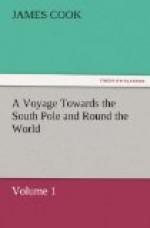The two following days were employed in clearing a place on Motuara Island for erecting our tents for the sick (having then several on board much afflicted with the scurvy), the sail-makers and coopers. On the top of the island was a post erected, by the Endeavour’s people, with her name and time of departure on it.
On the 9th, we were visited by three canoes with about sixteen of the natives; and to induce them to bring us fish and other provisions, we gave them several things, with which they seemed highly pleased. One of our young gentlemen seeing something wrapt up in a better manner than common, had the curiosity to examine what it was; and to his great surprise found it to be the head of a man lately killed. They were very apprehensive of its being forced from them; and particularly the man who seemed most interested in it, whose very flesh crept on his bones, for fear of being punished by us, as Captain Cook had expressed his great abhorrence of this unnatural act. They used every method to conceal the head, by shifting it from one to another; and by signs endeavouring to convince us, that there was no such thing amongst them, though we had seen it but a few minutes before. They then took their leave of us, and went on shore.
They frequently mentioned Tupia, which was the name of the native of George’s Island (or Otaheite), brought here by the Endeavour, and who died at Batavia; and when we told them he was dead, some of them seemed to be very much concerned, and, as well as we could understand them, wanted to know whether we killed him, or if he died a natural death. By these questions, they are the same tribe Captain Cook saw. In the afternoon, they returned again with fish and fern roots, which they sold for nails and other trifles; though the nails are what they set the most value on. The man and woman who had the head, did not come off again. Having a catalogue of words in their language, we called several things by name, which surprised them greatly. They wanted it much, and offered a great quantity of fish for it.
Next morning, they returned again, to the number of fifty or sixty, with their chief at their head (as we supposed), in five double canoes. They gave us their implements of war, stone hatchets, and clothes, &c. for nails and old bottles, which they put a great value on. A number of the head men came on board us, and it was with some difficulty we got them out of the ship by fair means; but on the appearance of a musket with a fixed bayonet, they all went into their canoes very quickly. We were daily visited by more or less, who brought us fish in great plenty for nails, beads, and other trifles, and behaved very peaceably.




